Ramadan
Published Friday, November 17, 2006 by Pyramid-Six.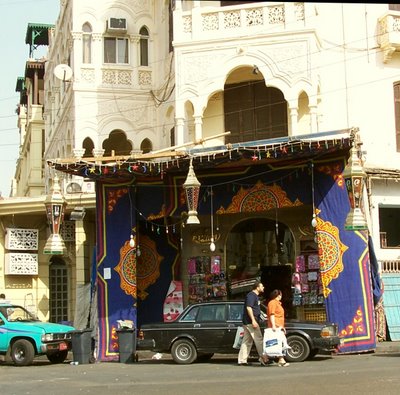
During Ramadan storefronts are festooned with colorful tapestries and lights. The "fanoos," the triagular lantern which is a traditional fixture during Ramadan, hangs everywhere. The stores are stocked to the brim with all sorts of goodies not always available the rest of the year.

Candy and nuts everywhere.
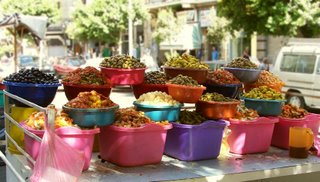
How many ways can you do olives?
Those who participate in the fast rise about 4:30 every morning to eat and drink. Soon thereafter the call to prayer sounds, signaling the start of the day's fast. At dusk, another call to prayer signals the end of the fast and the beginning of a meal called the "iftar" (literally, "the breaking of the fast"). The hours that follow are a festive time when everyone eats, visits, shops, eats, socializes, eats, and sleeps a little (and did I mention eating?) before the early morning call to prayer begins the next day's abstentions.
Here (below) is Grant wearing his galabaya for a Ramadan program at his hadona (preschool). The stuffed guy standing behind them is the drummer who roams the streets at about 4:00 every morning during Ramadan making lots of noise to ensure that everybody wakes up in time to eat before the fast begins.

After a day with no food, water, cigarettes, or anything else along those lines, the typical Egyptian is very intent on being in position for the iftar at the appointed time. The last half hour before dusk is not a good time to on streets full of hungry, thirsty drivers! But then the call to prayer sounds, and for the next half hour or so the streets are eerily deserted.

Since the weather was still hot this year during Ramadan, the first order of business at the breaking of fast was to drink! Stands like this (above) are set up on street corners everywhere to provide instant refreshment as soon as the call to prayer sounds. The little blue plastic bags in the picture below are also full of drink. You poke a hole in the bottom and drain it dry.

The main point of Ramadan is to cultivate a heightened focus on God, His blessings, and one's duty toward the poor. I can attest that after a long day without food or water, one develops a stronger appreciation for the things that appear on his dinner/iftar table! During Ramadan the people make a special effort to give money and food to people in need.
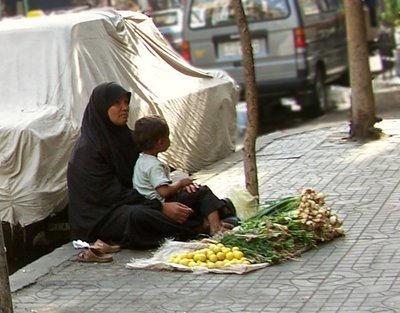
This woman and her son (above) are trying to earn a living selling a couple dollars' worth of produce on the street. Below is a scene from an outdoor Islamic worship event during the "Eid," the three-day feast at the conclusion of Ramadan.
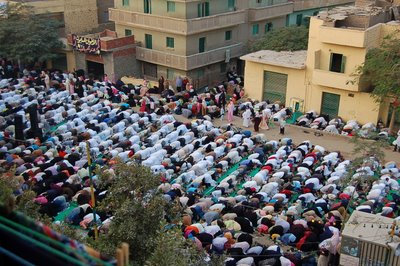
For the Muslim, strict adherence to the fast, giving alms to the poor, and diligent attention to daily prayers and other Ramadan observances are supposed to earn them extra points for potential admission to paradise. Of course, not everyone participates. Here's a coffee shop that stayed open during the day. Notice the newspaper over the windows. You wouldn't want folks to spot you if you sneaked in for a smoke or a cup of tea!
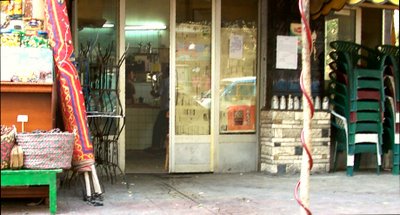
The Brelands

Last posts
Archives
Links
- Egypt Directories
- Egyptian Culture Guide
- BugBog Travel Guide
- Ex-Pat Focus
- Tour Egypt! Guide
- Virtual Tourist Guide
- Fodors Online
- CIA World Factbook
- U.S. State Department
- Egyptian History Overview
- Islamic History Overview
- Coptic Christianity in Eg
- Egyptian Legal System
- Guide to Egyptian Law
- Am Chamber of Cmrce - Eg